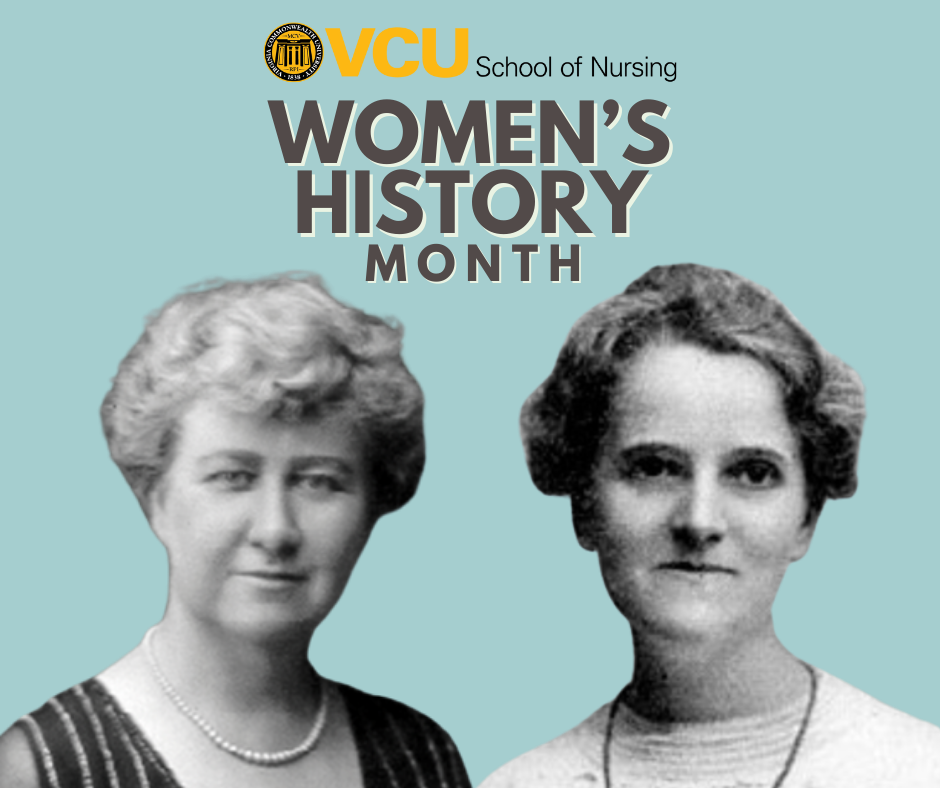Activists, advocates and leaders: alum nursing pioneers

The VCU School of Nursing honors the women who pioneered nursing education as we know it today. To celebrate Women’s History Month, we look back on the lives of two early advocates of public health and nursing whose work advanced the profession, championed the well-being of the Central Virginia community and strengthened the foundations for nursing education at VCU.
Agnes Dillon Randolph (1875-1930)
Agnes Dillon Randolph was an early advocate for the professionalization of nursing and was appointed as director of the Virginia Hospital Training School for Nurses (precursor to the VCU School of Nursing) in 1900, where she herself earned a degree just two years earlier. Dedicated to many causes including women’s suffrage and community health, she was an instrumental force in revolutionizing nursing administration in the face of nurse shortages during World War I. She was an active champion not just in nursing education circles but also in local and state politics as well, lobbying for the passage of the 1903 Nurse Practice Act that standardized and legitimized nursing education standards to protect public health.
Randolph was also active in raising awareness about and addressing resources to treat tuberculosis. She was a vocal proponent in Virginia’s General Assembly to ensure that funds were appropriated for tuberculosis clinics for African Americans as well as white patients. She served as executive secretary of the Virginia Tuberculosis Association and was instrumental in the creation of the Tuberculosis Commission by the General Assembly. She was an ally of and frequent speaker to the Negro Organization Society, a grassroots advocacy association that stressed community self-improvement for African Americans in Virginia during the Jim Crow era, partnering with them to push for a state-operated sanatorium for African Americans. “Miss Randolph probably did more to educate the people of Virginia of the need for organized tuberculosis work than any one person,” said historian and editor of the contemporaneous Richmond News Leader, Douglas Southall Freeman.
She was the best lobbyist, male or female, that this generation has seen on Shockoe Hill.
historian and editor of the Richmond News Leader, Douglas Southall Freeman
Randolph held her post as director of the Virginia Hospital Training School for Nurses until the summer of 1913 when it merged with the Old Dominion Hospital Training School for Nurses to form the Medical College of Virginia School of Nursing. She held several posts as a nursing leader in state agencies and as a superintendent of nurses at Richmond’s Memorial Hospital, before her death in 1930.
Nannie Jacquelin Minor (1871–1934)
After graduating from Old Dominion Hospital Training School for Nurses in 1900, Nannie Jacquelin Minor worked side-by-side with Sadie Heath Cabaniss, her mentor and her school’s founding director, to establish the Instructive Visiting Nurses Association of Richmond, a community health organization that provided care and advocacy for the greater Richmond community. Minor served as the IVNA leader for 20 years before being appointed as the founding director of the Bureau of Public Health Nursing, a division of the Virginia Department of Health. Among her many achievements, she was part of a generation of nursing leaders that led the standardization of practices in order to make care available to those in need.
How readily the historian of Virginia will find and fix her place, we cannot say; but always in the memory of those who knew her and were privileged to share even to a small degree in her work, she will remain a gracious and appealing figure, ‘Virginia’s Sister of Charity.’
historian and editor of the Richmond News Leader, Douglas Southall Freeman
Minor is remembered for her contributions to nursing in Virginia that shaped the early development of the profession and helped to establish 45 public health nursing services throughout the state. “As sure as any woman who came to Jamestown, she was a pioneer; but she was more than a pioneer. Her dream was not that of some new adventure beyond the traveled world; it was that of a city eased of pain, a social order free of injustice, a society of happiness,” wrote historian and editor of the contemporaneous Richmond News Leader, Douglas Southall Freeman.
In her later years, Minor was committed to documenting the history of community health nursing, collecting information from nurses from around Virginia to record their work in public health in the early 1900s. She died in West Virginia in 1934 and, in 2000, was memorialized on the Virginia Women’s Monument’s glass Wall of Honor.
by Moira Neve
Categories Alumni and Friends, News



